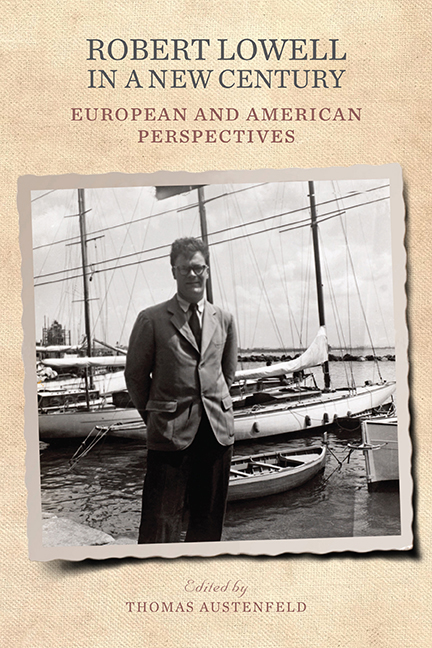Book contents
- Frontmatter
- Dedication
- Contents
- Acknowledgments
- Introduction
- 1 Revisiting Robert Lowell's Mental Hospital Poems
- 2 Sensual Drift and Ethnic Longing in Robert Lowell
- 3 Reworking the Same Water: Robert Lowell Transported
- 4 “Sweet salt embalms me”: A Hippocratic Approach to the Role of the Sea in the Poetry of Robert Lowell
- 5 More Delicate Than the Historian's Are the Map-Maker's Colors: Correspondences between Lowell's Poetics of History and Bishop's Poetics of Space
- 6 Robert Lowell and Ezra Pound's Economics
- 7 Robert Lowell and Ezra Pound in Washington and Rapallo
- 8 “Why Holland?”: Robert Lowell in Amsterdam
- 9 Lowell and Ungaretti: Imitations and Beyond
- 10 Robert Lowell's Credo
- 11 “Marriage? That's another story”: Reconsidering the Marital Trope in Robert Lowell's Poetry
- 12 “Oh No”/“Yes Yes”: Lowell and the Making of Mistakes
- 13 Robert Lowell: The Power of Influence
- Notes on Contributors
- Index
13 - Robert Lowell: The Power of Influence
Published online by Cambridge University Press: 26 June 2019
- Frontmatter
- Dedication
- Contents
- Acknowledgments
- Introduction
- 1 Revisiting Robert Lowell's Mental Hospital Poems
- 2 Sensual Drift and Ethnic Longing in Robert Lowell
- 3 Reworking the Same Water: Robert Lowell Transported
- 4 “Sweet salt embalms me”: A Hippocratic Approach to the Role of the Sea in the Poetry of Robert Lowell
- 5 More Delicate Than the Historian's Are the Map-Maker's Colors: Correspondences between Lowell's Poetics of History and Bishop's Poetics of Space
- 6 Robert Lowell and Ezra Pound's Economics
- 7 Robert Lowell and Ezra Pound in Washington and Rapallo
- 8 “Why Holland?”: Robert Lowell in Amsterdam
- 9 Lowell and Ungaretti: Imitations and Beyond
- 10 Robert Lowell's Credo
- 11 “Marriage? That's another story”: Reconsidering the Marital Trope in Robert Lowell's Poetry
- 12 “Oh No”/“Yes Yes”: Lowell and the Making of Mistakes
- 13 Robert Lowell: The Power of Influence
- Notes on Contributors
- Index
Summary
ROBERT LOWELL HAD a genius for discipleship—and he was a lifelong learner, perpetually evolving his craft and extending his reach. As a young writer, Lowell established close relationships with an extraordinary range of senior mentors, a tricky undertaking since many of these elders had staked out positions in opposing literary camps. The opening pages of Lowell's Letters, edited by Saskia Hamilton, show Lowell cultivating—at first with a certain endearing naiveté—connections with more than one of these various elder literary mentors. And then there's the famous story of the young Lowell camping out in a Sears Roebuck tent on Allen Tate's lawn, while Tate, his wife Caroline Gordon, and their friend Ford Madox Ford looked on bemused. By the time Lowell hit his full artistic stride, he had established relationships with such senior literary mentors as Tate, Ford, Robert Frost, John Crowe Ransom, George Santayana, William Carlos Williams, and T. S. Eliot—just to name a few.
At the same time, Lowell was developing relationships with contemporaries who were just a few years older than he was—I have called these his “peer-mentors”—including Elizabeth Bishop, Randall Jarrell, John Berryman, Delmore Schwartz, Mary McCarthy, and Theodore Roethke. Lowell had much to learn from these slightly elder contemporaries—as well as much to impart. When Lowell became himself a teacher and grew into a senior literary presence, he influenced successive generations of younger poets, including, among many others, W. D. Snodgrass, Sylvia Plath, Anne Sexton, Frank Bidart, and Derek Walcott. Yet even as Lowell helped to inspire and encourage the work of these younger poets, he often seemed to discover suggestions in their work that helped him to extend his art and to generate a significant number of important poems—poems that serve to exemplify for Lowell what I am calling the “power of influence.”
Lowell's poetry might be read in significant measure as a catalogue of ongoing conversations with individuals who shaped his life and art in important ways. What is striking about Lowell's relationships with literary elders, contemporaries, and juniors—and the poems he wrote about them—is their quality of give-and-take.
- Type
- Chapter
- Information
- Robert Lowell in a New CenturyEuropean and American Perspectives, pp. 170 - 182Publisher: Boydell & BrewerPrint publication year: 2019



